This week's Slott Report Mailbag discusses some complex, timely issues involving distributions and Roth conversions. As always, we stress the importance of working with a competent, educated financial advisor to keep your retirement nest egg safe and secure.
1.
Mr. Slott,
I work directly with a not-for-profit employer group who sponsors a 401(k) retirement plan. The plan takes after-tax employee contributions (up to 3%) and then matches these employees with a dollar for dollar employer contribution. Upon termination from the plan, the employee essentially has two "buckets of money", the pre-tax money (employer contributions and gains on the account) and the after-tax money (the employee contributions).
I know the employee can take the pre-tax money and roll it over to an IRA. My question is regarding the after-tax money. Do they have the option of converting only these after-tax funds from the 401(k) plan into a Roth IRA?
I couldn't think of a better source to ask. Any guidance would be greatly appreciated!
Thanks!
Answer:
You raise a very good question. This question is being discussed by many IRA specialists. The IRS has issued conflicting guidance on whether or not you can do a rollover of after-tax funds to a Roth IRA income-tax-free. The interpretation of Code section 402(c)(2) and IRS notice 2009-68 are very confusing at best. Treasury officials are aware of this issue and are currently looking at it. The IRS issued its Spring 2010 newsletter that appears to take the pro-rata allocation approach. However, after all of the above many plan administrators continue to advise their plan participants that this can be done.
2.
In October 2009, I did a rollover in my IRA which was duly reported. In February 2010, while doing a number of transactions on my computer for the same IRA account, I inadvertently created a distribution to myself rather than what I had intended to do--namely, a transfer of funds from several Vanguard funds to another fund, all within the same IRA. When I realized my mistake the next morning, I immediately called Vanguard to correct the error, but was told it was too late, the so-called distributions were already being mailed to me.
When I received the checks a few days later, I returned them to Vanguard within hours, to be deposited back to my IRA, which was done. Vanguard has considered this a rollover, even though that was never my intention. So now, technically, I have two rollovers within four or five months.
Is there a mechanism by which I can explain the circumstances of the second 'rollover' to the IRS and get a ruling from them before it would normally come to their attention in 2011 or 2010, or later? I am 88 years old and my chances of surviving another 2-3 years at 50/50. I would like to avoid having it dangle over my wife's head when I am gone.
S. Friedman
Answer:
You are correct that an IRA holder may roll over only one distribution from an IRA within a one year period. Also, distributions done the same day are considered one rollover. However, since you did a rollover in October, 2009, your distributions in February are not eligible for rollover. Unfortunately, IRS does not have the authority to waive this rule for anyone. In addition, since you are over age 70 1/2 any of those funds needed to satisfy your required distribution for this year would also not have been eligible for rollover. The funds need to be removed from your IRA as an excess contribution (make sure that is the box you mark on the distribution form). You have until October 15, 2011 to remove the funds and you must also take any earnings on the funds out of the account. The entire distribution (the February checks and the earnings) will be taxable for 2010, even if you do the correction in 2011.
3.
If I were to convert a rollover IRA this year to a Roth IRA, when would the taxes be due and what kind of payment plans are available? I heard the taxes could be paid over two years time. I just finished your book, it was very informative.
Thank you,
Andrew O'Toole
Answer:
I'm glad you enjoyed the book.
For all Roth conversions in 2010, and only 2010, you have the following options:
1. Add the conversion, pre-tax dollars, to your 2010 income and pay the income tax due on your 2010 Form 1040.
2. If you decide not to include that income in 2010 then you can add half the conversion amount to your 2011 income and the other half to your 2012 income.
Keep in mind that if you have both pre-tax and after-tax dollars in your IRA, you must pro-rate the converted amount between pre-tax and after-tax dollars. All IRAs including SEP and SIMPLE IRAs, even the ones you are not converting, must be considered.
By IRA Technical Consultant Marvin Rotenberg and Jared Trexler
------------------------------------------------------------------------------
Comment, Question, Discussion Topic on your mind? Click on the Blue Comment Link below and leave your thoughts then check back to see what other consumers and advisors think.
*Copyright 2010 Ed Slott and Company, LLC
Thursday, September 2, 2010
2010 Roth Conversions Highlight Mailbag
Posted by
Ed Slott and Company, LLC
at
9:45 AM

 Labels:
IRAs,
Mailbag,
Retirement,
Roth Conversions,
Roth Distributions,
Roth IRAs
Labels:
IRAs,
Mailbag,
Retirement,
Roth Conversions,
Roth Distributions,
Roth IRAs
Subscribe to:
Post Comments (Atom)
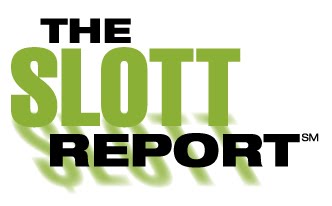

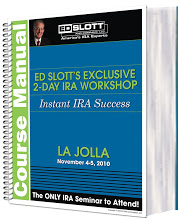
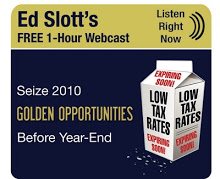

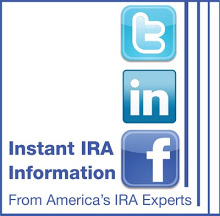


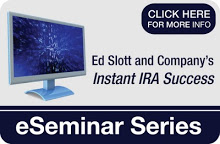







1 comments:
It is said the Roth Conversion is advised if you expect to have taxes as high in retirement as you do now. I've really been thinking about moving my traditional IRA that was rolled over from a previous 401-k but I just don't see how my income would be higher in retirement as both my spouse and I have well paying jobs and even if we do work part-time in retirement I wouldn't expect to be making anywhere near what our income is now. Even if we were able to accumulate 1 Million $'s in our retirement accounts in the next 10 years, which I doubt considering what has happened to them during the last decade and the prospects ahead, with the standard rule of thumb using 4% withdrawals a year would still only be $40k a year.
So I guess my question is...just how many people actually make more income in retirement than when they are working and is that the main reason to consider the Roth conversion? How can one truly get a good estimate of their income in retirement?
Post a Comment